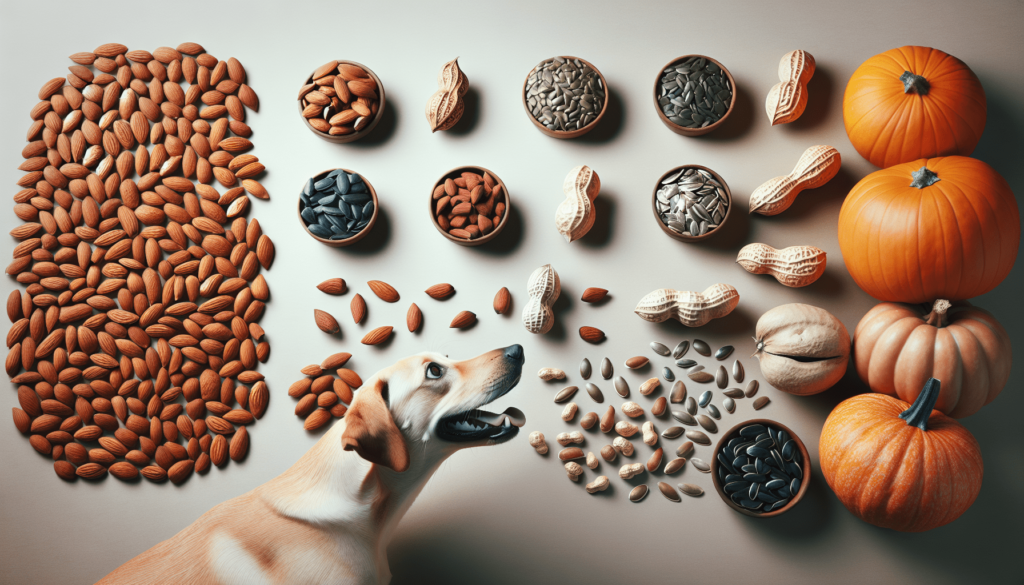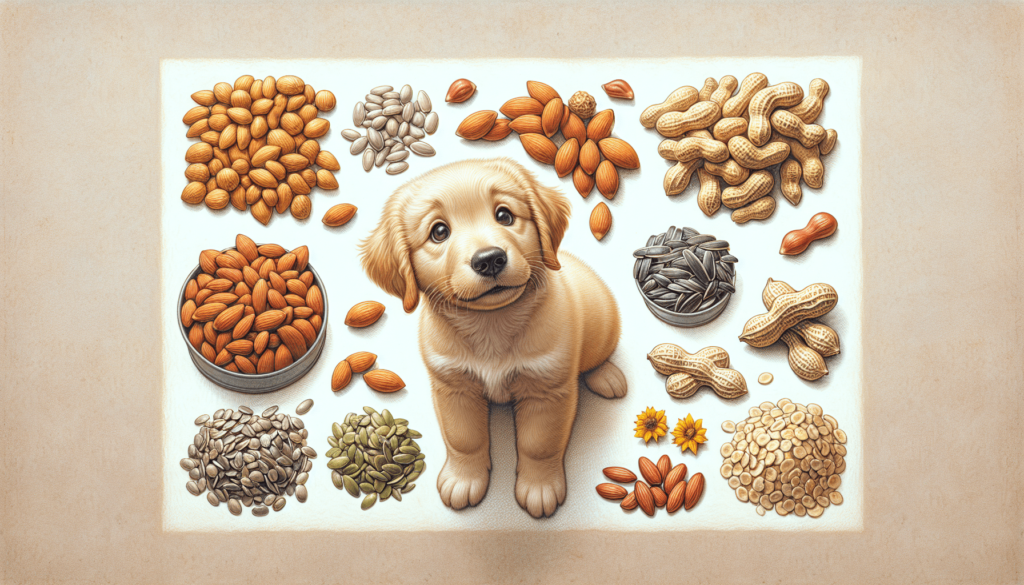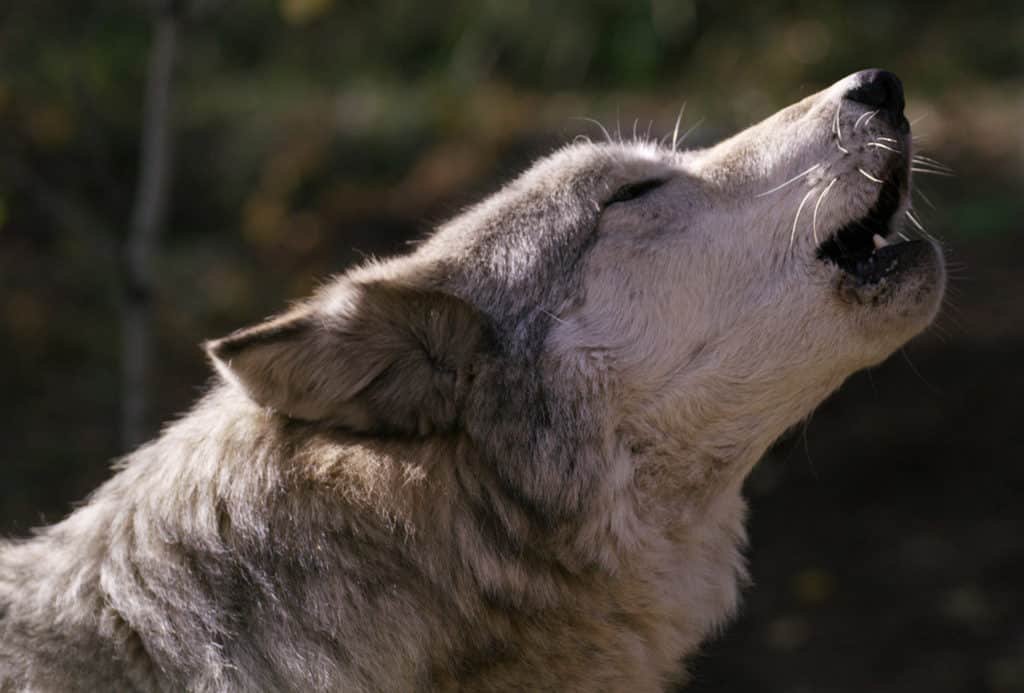Have you ever wondered if dogs can eat nuts and seeds? As we’ve all observed, our furry friends often have keenly curious appetites. Whether they sniff out a corner of cheese in the most remote kitchen nook or stand diligently by your side as you munch on snacks, it seems they want in on just about everything. It’s only natural to want to share with them, but not everything that’s safe for humans is equally okay for dogs. This brings us to the question at hand: can dogs eat nuts and seeds? Let’s dig deeper into this intriguing topic, and hope to offer some clarity about how these small but powerful foods might impact our beloved pets.

Understanding a Dog’s Diet
Before jumping into specifics about nuts and seeds, it’s important to acknowledge what’s generally considered a healthy diet for dogs. Unlike humans, dogs are primarily carnivorous. However, they can thrive on a balanced mix of proteins, carbohydrates, and fats. A typical canine diet usually consists of meats, grains, and vegetables, which are crucial for their growth and energy.
Commercial dog foods are often tailored to meet these nutritional needs. Still, as dog owners seeking to occasionally introduce new foods, understanding the potential benefits and risks of atypical food items helps us make informed choices.
Can Dogs Eat Nuts?
Nuts can be a tasty treat—or a dangerous snack—depending on the type. Some nuts might contain beneficial nutrients, but others can be toxic or cause medical issues for dogs. Let’s explore some common nuts and their compatibility with canines.
Nuts That Are Safe for Dogs
Peanuts
Peanuts, particularly when unsalted and raw, can be safe for dogs. They are packed with protein and healthy fats, providing a boost of energy. However, moderation is key. Peanut butter, an often-preferred treat, should be given in small quantities and should be free of xylitol, a sweetener toxic to dogs.
Almonds
While almonds are not toxic to dogs, they aren’t easily digestible and can cause gastrointestinal issues. If you plan on offering almonds, keep them to a minimum and ensure they’re unsalted and chopped to avoid choking hazards.
Nuts That Dogs Should Avoid
Macadamia Nuts
These nuts are especially dangerous for dogs and should always be avoided. Even small quantities can lead to macadamia nut poisoning, which manifests through symptoms like weakness, vomiting, and hyperthermia.
Walnuts
Similar to macadamia nuts, certain walnuts—a type especially prone to mold—can be extremely harmful. Moldy walnuts may contain fungi that induce seizures or cause neurological symptoms in dogs.

Can Dogs Eat Seeds?
Seeds, like nuts, come in many varieties, each with its own set of attributes. While some seeds offer health benefits, others can be dangerous. Here’s a rundown on some common seeds and whether they can find a place in your dog’s diet.
Seeds That Are Safe for Dogs
Chia Seeds
Chia seeds are a tiny powerhouse of nutrients, such as omega-3 fatty acids, antioxidants, and fiber. These seeds can support your dog’s energy levels and promote a healthy coat. Ensure you soak them in water before serving to make them easier to digest.
Sunflower Seeds
Sunflower seeds, when unsalted and hull-less, can also be a healthy, occasional snack. They contain healthy fats and essential minerals. Just be cautious of the high calorie and fat content, sticking to small amounts to avoid weight gain.
Seeds That Dogs Should Avoid
Poppy Seeds
Poppy seeds are a definite no for dogs. These seeds contain alkaloids that can lead to a wide range of symptoms from lethargy to neurological issues if ingested.
Apple Seeds
While technically not thought of as typical seeds, the seeds in apples contain cyanogenic glycosides, which can lead to cyanide poisoning if consumed in large quantities. Always core apples before sharing them with your dog.
Nutritional Benefits and Potential Risks
Integrating nuts and seeds into your dog’s diet could be beneficial due to the dense nutrition content they deliver. Many nuts and seeds are rich in omega-3 fatty acids, protein, and various vitamins. These nutrients can contribute to a shiny coat, healthy skin, and a robust immune system.
However, potential risks often accompany these benefits. Nuts and seeds are calorie-dense and could lead to weight gain when fed in excess. Choking hazards are also a concern, particularly with smaller seeds or larger nuts if not properly prepared.
Table – Nutritional Overview: Nuts and Seeds for Dogs
| Type of Nut/Seed | Safe for Dogs? | Key Nutrients | Potential Risks |
|---|---|---|---|
| Peanuts | Yes | Protein, Healthy fats | Salt, xylitol in commercial peanut butters |
| Almonds | Caution | Vitamin E, Fiber | Digestive issues, high-fat content |
| Macadamia Nuts | No | N/A | Neurological symptoms, weakness, vomiting |
| Walnuts | No | N/A | Seizures, fungal poisoning |
| Chia Seeds | Yes | Omega-3s, Fiber | Possible digestive upset if not soaked |
| Sunflower Seeds | Yes | Healthy fats, Minerals | High-calorie content, choking hazard |
| Poppy Seeds | No | N/A | Lethargy, neurological issues |
| Apple Seeds | No | N/A | Cyanide poisoning from cyanogenic compounds |
Making Safe Choices for Your Dog
Moderation is Key
When it comes to nuts and seeds, less is often more. By offering these foods in small quantities, you can safely provide your dog with additional nutrients without upsetting their dietary balance. Start with minute amounts and observe how your dog reacts before introducing them as a regular treat.
Prioritize Safety
The safest nuts and seeds are those that come unsalted and unprocessed. Avoid any products with artificial flavorings, sugar, or other additives. Checking for xylitol or other artificial sweeteners is critical.
Consult a Veterinarian
Before introducing any new food item into your dog’s diet, especially when it comes to nuts and seeds, it’s wise to have a discussion with your vet. This step ensures personalized advice that considers your pet’s specific health conditions or dietary restrictions.
FAQ
Can dogs eat nuts and seeds?
Yes, but with caution. Some nuts and seeds are safe in moderation, while others should be avoided due to potential toxicity.
What are the safest nuts for dogs?
Peanuts are among the safest options, as long as they’re unsalted and xylitol-free. Almonds can also be okay but should be monitored for digestive issues.
Are sunflower seeds good for dogs?
Yes, when unsalted and without the hull, sunflower seeds can be a healthy treat.
Why are macadamia nuts harmful to dogs?
Macadamia nuts contain toxins that can cause severe health issues, including coordinated motor function impairment and vomiting.
Is it harmful if my dog eats a few apple seeds accidentally?
While a small number of apple seeds may not cause immediate harm, consistent consumption or a large quantity can be dangerous due to cyanide content.
In summary, while dogs can safely consume certain nuts and seeds, others pose significant risks. Knowledge and discretion empower us to make wise choices for our furry family members. By carefully selecting and moderating the right types of treats, we can enrich their diet and enrich their lives.



